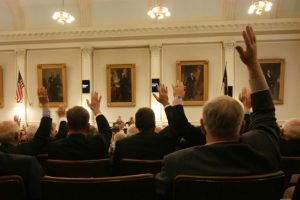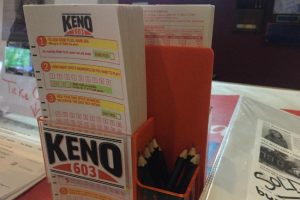 Last year, New Hampshire approved a bill that is to partially fund full-day kindergarten by legalizing the electronic bingo game Keno. The House and the Senate faced the moral question if it is appropriate to fund full-day kindergarten programs with money from gambling. The debate finished with the two chambers agreeing to pay for the full-day kindergarten programs with money from gambling. New Hampshire communities were allowed to decide whether to embrace the recently-authorized Keno lottery game to be played at public places such as restaurants and bars.
Last year, New Hampshire approved a bill that is to partially fund full-day kindergarten by legalizing the electronic bingo game Keno. The House and the Senate faced the moral question if it is appropriate to fund full-day kindergarten programs with money from gambling. The debate finished with the two chambers agreeing to pay for the full-day kindergarten programs with money from gambling. New Hampshire communities were allowed to decide whether to embrace the recently-authorized Keno lottery game to be played at public places such as restaurants and bars.
Two days ago, Casino Reports produced an article about Lebanon, which was about to discuss the perspective of putting the Keno question on a ballot. Earlier today, it surfaced that the City Council is not enthusiastic to allow locals to decide the future of the bingo-like Keno game. It was explained that Keno can provoke gambling-related problems, while the councilors should prevent locals from such threats. This is not the first time, in which Lebanon councilors are discussing the perspective of allowing voters to decide whether the city should offer Keno.
According to the latest updates, council members voted 7-2 against putting Keno question on a ballot. This means that the future of Keno within Lebanon is pretty much determined. In that way, Lebanon has become the other New Hampshire community that has decided not to put Keno question on a ballot. Currently, there are 11 communities that have presented their stance on the matter. The official results showed that 7 communities are to welcome the bingo-like game.
Presenting the Different Arguments on the Matter
 As aforementioned, only 2 councilors, including Karen Liot Hill and Bruce Bronner, supported the proposed ballot. They explained that the locals have the right to express their stance on the matter. Mayor Sue Prentiss and Assistant Mayor Tim McNamara together with councilors Clifton Below, Erling Heistad, Sarah Welsch, Jim Winny and Shane Smith voted against the ballot. They explained that Keno is classified as a gambling game, which may have a devastating effect on people’s lives.
As aforementioned, only 2 councilors, including Karen Liot Hill and Bruce Bronner, supported the proposed ballot. They explained that the locals have the right to express their stance on the matter. Mayor Sue Prentiss and Assistant Mayor Tim McNamara together with councilors Clifton Below, Erling Heistad, Sarah Welsch, Jim Winny and Shane Smith voted against the ballot. They explained that Keno is classified as a gambling game, which may have a devastating effect on people’s lives.
An important aspect of the new law is that all New Hampshire communities will receive the share from Keno revenues, regardless of which communities approved Keno. It is important to note that the law, that allows the provision of Keno throughout New Hampshire requires at least 1% of the total profit to be invested in supporting gambling addiction treatment programs. In addition to that, the state Lottery Commission also invests $25,000 per year in such programs. At present, nearly 75% of New Hampshire communities offer full-day kindergarten programs, but the state is unable to cover all the expenses.











